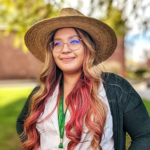In November of 2021, devastating floods overtook the Fraser Valley, leaving farms in ruins and many homeless. As the community works toward returning to normalcy and recovering from the damages, the Flood Stories project was started to help the people heal through a creative and tangible form.
One of the many impacted by the floods was Michelle Superle, associate professor at UFV, who was evacuated from her home at the beginning of the floods. Fortunately, she was able to return home with minimal damages to her own abode and immediately started volunteering at the Yarrow Food Hub. During her time there, she saw a real need for people to find ways to cope and process.
Superle explained that while volunteering and doing interviews for an article she wrote for edible Vancouver & Wine Country, she found people wanting to write about their experiences but not knowing how to start. “Many people would say to me, ‘oh you know I’ve always wanted to write a book. I’ve always wanted to write such and such.’ Then after a while I had this idea, that it might hold up and be helpful for them to write about this, because I had just read [UFV student] Lauryn Joly’s term paper on expressive writing as a way of supporting resilience and mental health.”
That was the very beginning of the long road of the Flood Stories project. From there, Superle started working with Joly to create a workshop to help the community express their experiences and hopefully find a sense of healing along the way.
According to Superle, the project shifted into creating “a public platform for more people to share how they were affected by the flooding.” The most recent addition to the project was an Expressive Art contest, which gave people of all ages a chance to work through their emotions through creative forms of writing, art, and other creative mediums, while providing them with an opportunity to have those passionate pieces shared with the public.
As the project began to come together, Superle had students come to her wanting to write and participate, though they weren’t directly impacted by the floods. This spawned the second prompt in the contest: express gratitude for local farmers.
“It’s been hugely, hugely challenging and I don’t know if that’s mostly because this kind of work is very new to me. I’m trained as a literary scholar and an English professor, and I’m pretty good at those things. But this kind of research, this level of project development and coordination, is absolutely new to me,” Superle explained.
“I’ve had quite a large team of students working with me, which has been wonderful, but all of those things are quite new to me and to be doing them all at once and in such a high stakes situation. I’m always mindful that I want to be respectful of people’s experiences and time, and making sure that we’re only adding beneficial aspects to their lives and experiences, and not causing any kind of harm,” said Superle when discussing what it’s been like bringing such a large project together during a sensitive time.
The final day for submissions was Nov. 4. The competition has multiple categories including written, visual art, auditory, and kinesthetic. Within the categories are age groups such as students in grades K-7, students in grades 8-12, and a section for the UFV community.
“I hope to keep offering the ‘writing to heal workshop.’ I would also like to pass along the resource booklets and the method [for expressive writing] to train students, folks, advocates, and facilitators at the Peer Wellness Center,” said Superle, looking back on the work done so far.
Disclosure: The Cascade’s Managing Editor, Sydney Marchand, is involved in the Flood Stories project as a student research assistant. To avoid any conflict of interest, she had no editorial input on the selection of this topic or the writing of this article.

Emmaline is working on her BA and ambitions to become an English teacher. They always say, those who cannot do, teach. She spends her free time buying, reading, and hoarding books with the hope that one day she will have no furniture and instead only have piles of books.


